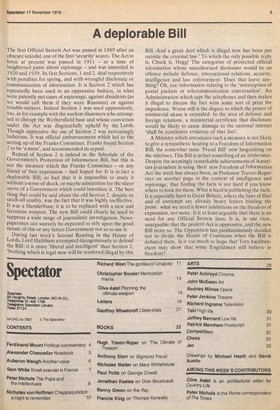A deplorable Bill
The first Official Secrets Act was passed in 1889 after an obscure scandal, one of the first 'security' scares. The Act in force at present was passed in 1911 — at a time of heightened panic about espionage — and was amended in 1920 and 1939. Its first Sections, 1 and 2, deal respectively with penalties for spying, and with wrongful disclosure or communication of information. It is Section 2 which has repeatedly been used in an oppressive fashion, in what were patently not cases of espionage, against dissidents (as we would call them if they were Russians) or against trouble-makers. Indeed Section 1 was used oppressively, too, as for example with the nuclear disarmers who attempted to disrupt the Wethersfield base and whose conviction under the Act was disgracefully upheld by the Lords. Though oppressive the use of Section 2 was increasingly ludicrous. It was official embarrassment which led to the setting up of the Franks Committee. Franks found Section 2 to be 'a mess', and recommended its repeal.
Repeal, of Section 2 is indeed in the Schedule of the Government's Protection of Information Bill, but this is not the measure which the Franks Committee — or any friend of free expression — had hoped for. It is in fact a deplorable Bill, so bad that it is impossible to study it without a sense of shock, or maybe admiration for the sheer nerve of a Government which could introduce it. The best thing that could be said about the old Section 2, despite its catch-all quality, was the fact that it was highly ineffective. It was a blunderbuss; it is to be replaced with a new and ferocious weapon. The new Bill could clearly be used to suppress a wide range of journalistic investigation. Newspapermen can scarcely be expected to rely upon the good nature of this or any future Government not so to use it. During last week's Second Reading in the House of Lords, Lord Hailsham attempted disingenuously to defend the Bill: it is more 'liberal and intelligent' than Section 2. 'Nothing which is legal now will be rendered illegal by this Bill. And a great deal which is illegal now has been put outside the criminal law.' To which the only possible reply is, Chuck it, Hogg! The categories of protected official information whose unauthorised disclosure would be an offence include defence, international relations, security, intelligence and law enforcement. Does that leave anything? Oh, yes: information relating to the 'interception of postal packets or telecommunication conversation'. An Administration which taps the telephones and then makes it illegal to discuss the fact wins some sort of prize for impudence. Worse still is the degree to which the power of ministerial ukase is extended. In the area of defence and foreign relations, a ministerial certificate that disclosure would be likely to cause damage to the national interest 'shall be conclusive evidence of that fact'.
A Ministry which introduces such a measure is not likely to give a sympathetic hearing to a Freedom of Information Bill, the somewhat tame 'Freud Bill' now languishing on the sidelines. This Bill is in fact something of an irrelevance. Despite the seemingly remarkable achievements of American journalists in using their new Freedom of Information Act the truth has always been, as Professor Trevor-Roper says on another page in the context of intelligence and espionage, that finding the facts is not hard if you know where to look for them. What is hard is publishing the facts. It is especially hard in Great Britain, where the laws of libel and of contempt are already heavy fetters binding the press: what we need is fewer inhibitions on the freedom of expression, not more. It is at least arguable that there is no need for any Official Secrets laws. It is, in our view, unarguable that the present Act is oppressive, and the new Bill more so. The Opposition has pusillanimously decided not to divide the House of Commons when the Bill is debated there. Is it too much to hope that Tory backbenchers may show that some Englishmen still believe in freedom?






































 Previous page
Previous page